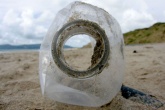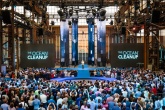Summer beach clean competition offers prizes for plastic

In an effort to raise awareness about marine plastic pollution and the need to clear it from our beaches, the #SavedFromTheSea campaign, held in partnership with outdoor brand Fjällräven, asks holiday makers to spend five minutes doing a beach clean before taking a photo of either the most unusual item found, or coming up with a creative way to reuse something in their collection.
The competition is being hosted on Twitter and will run up until the 31 August, with the four most inventive entries being awarded a colourful Fjällräven Re-Kånken rucksack made from recycled polyester.
“We decided to launch this photo competition this summer to raise awareness of the huge problem of litter, and of plastic in the marine environment, which is already affecting wildlife and ourselves,” says Eunomia CEO Dominic Hogg, who will judge the photos.
“We all need to wake up to this problem, and to make the link between stuff tossed away on the street, and the state of the world’s oceans.”
Entrants who come across plastic on their summer trips to the beach can enter the competition by tweeting either:
- ‘How did this ___ end up in the sea? #SavedFromtheSea @Eunomia_RandC’ for unusual items; or
- ‘#SavedFromTheSea so I can ___ @Eunomia_RandC’ for items to reuse.
One winner from each category will be chosen at the end of July and then the end of August.
“We hope entrants will have fun coming up with creative ideas for making use of the discarded items, and developing captions to go alongside their photos, all whilst doing something meaningful and contributing to maintaining the beauty of those parts of the world that we live in or visit on holiday.
“We’re delighted that Fjällräven has partnered with us on this to offer prizes that demonstrate what businesses can do when they prioritise manufacturing using secondary materials.”
Beach or Ocean Cleanup?
#SavedFromTheSea comes as a follow-up to Eunomia’s claim made last year that beaches are the best place to focus efforts to recover marine plastic pollution.
The organisation’s research found that over 80 per cent of the 12.2 million tonnes of plastic entering the marine environment every year comes from land-based sources, concluding that beach cleaning would be the best way to intercept plastic waste entering the sea or returning on ocean currents.

On a more worldwide scale, the International Coastal Cleanup, which collates the results of projects like the Great British Beach Clean, saw over 13.8 million pieces of litter collected from beaches by almost 800,000 volunteers. Over one million plastic bottles were picked up, making it the second most-littered item behind cigarette butts, with plastic caps, straws, bags and lids all in the top ten.
This beach-focused approach posits a contrast to another high-profile attempt to tackle marine pollution, The Ocean Cleanup Project. The project’s aim is to directly remove plastic from the Great Pacific Garbage Patch, an area containing roughly one third of all ocean plastic.
The Project operates under the assertion that the majority of marine plastics collect on the ocean’s surface. This is allegedly because ‘larger sized plastic pollution, which by mass represents most of the plastic in the ocean, is more buoyant and stays even closer to the sea surface’.
However, Eunomia’s research contends that barely one per cent of marine plastics are to be found floating at or near the ocean’s surface, with an average of less than one kilogramme (kg) found in each square kilometre (km2) of ocean.
More effective clean-up measures, it maintains, should be carried out on beaches, where the amount of plastic is estimated to be around five times greater than the ocean’s surface, and at a much higher concentration – 2,000kg/km2.
Presenting the findings last year, Chris Sherrington, Principal Consultant at Eunomia, said: “When plastic does get into the sea, it’s clear that efforts to remove it from the beaches are extremely valuable. They’re generally more accessible than the mid-ocean, there’s more material there overall than there is floating, and it is much more concentrated on beaches.”
More information about Eunomia’s #SavedFromTheSea competiton can be found on the company’s website.









